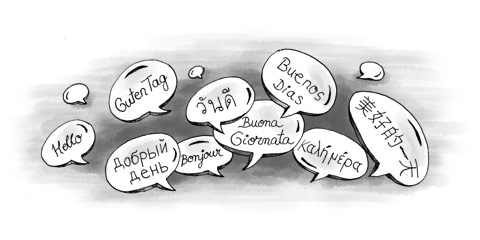Croatian, Slovenian and Hungarian are official languages in certain provinces of Austria. Nevertheless, German is the dominant and prevalent language spoken in Austria . It is also spoken in Germany, Liechtenstein, Luxembourg, large areas of Switzerland and parts of Northern Italy, Eastern Belgium and Eastern France. Around 100 million Europeans speak German, which means that after Russian it is the most widespread native language in Europe and amongst the ten most-spoken languages in the world.
However, you need to be aware that German is not exactly the same everywhere! Even though written language and grammar is uniform across the whole country, there is a wide range of regional accents and dialects. Some dialects, such as spoken in the Tyrol (Tirol) for example, are so strong that even Austrians have difficulty understanding them. Don't be surprised if you feel completely lost in the beginning when visiting these regions. This variety of languages reflects the wide variety of regional cultures and habits in Austria and is a source of many jokes. The strongest dialects are spoken in the Tyrol, in Vorarlberg and in parts of Styria (Steiermark).
"Hochdeutsch" and local dialects
If you've learned German abroad, you're probably accustomed to Hochdeutsch, which can be literary translated into "proper German". Most Austrians won't mind speaking Hochdeutsch, although in smaller villages the inhabitants will be sticking to their respective dialects.
There is a wide belief among foreigners that German is very similar to English, so some people think that if they speak English they will be able to learn German quickly. Without wanting to disillusion you, the reality is that the two languages have far less in common than many people believe. At least at a basic level, it is a lot easier to learn English as you don't have to struggle through complex sentence structures and the widely feared German "cases" (which basically define the role of a noun within a sentence). The fact that many Austrians and Germans speak very good English might be because, after struggling through their own language, they show little fear of learning another one!
The art of constructing long phrases
If you're going to study in Austria or read a lot of German documentation or papers, be prepared for a serious shock! Germans seem to perceive the construction of endless and completely incomprehensible sentences as a national sport. Don't be surprised if the introductory phrase of an academic paper is half a page long. You might get the impression that the author deliberately tries to scare you away from reading the rest of the document! Or maybe he just wants to test whether you're willing to spend half an hour decoding this sentence and therefore are able to digest the rest of his deep thoughts!
Despite these little obstacles, we strongly encourage you to learn at least some basic German. Even though you can get by with English in Austria, only when you get to know the language will you be able to get the most out of living in Austria. In order to study, you even have to prove that you have a good command of the German language. The only exceptions are international programs taught in English.
Don't be afraid of making mistakes, since Austrians are not as proud of their language as other nationalities (like the French) and are therefore normally very forgiving when it comes to their languages. Austrians will appreciate your effort of communicating in German, and they will love you for using special Austrian phrases. Have fun!



